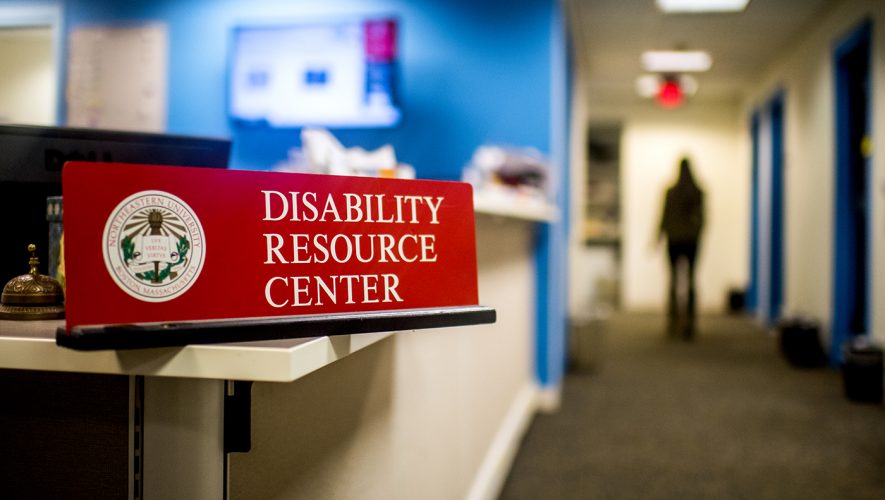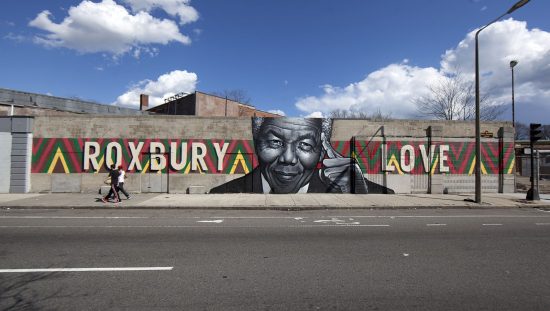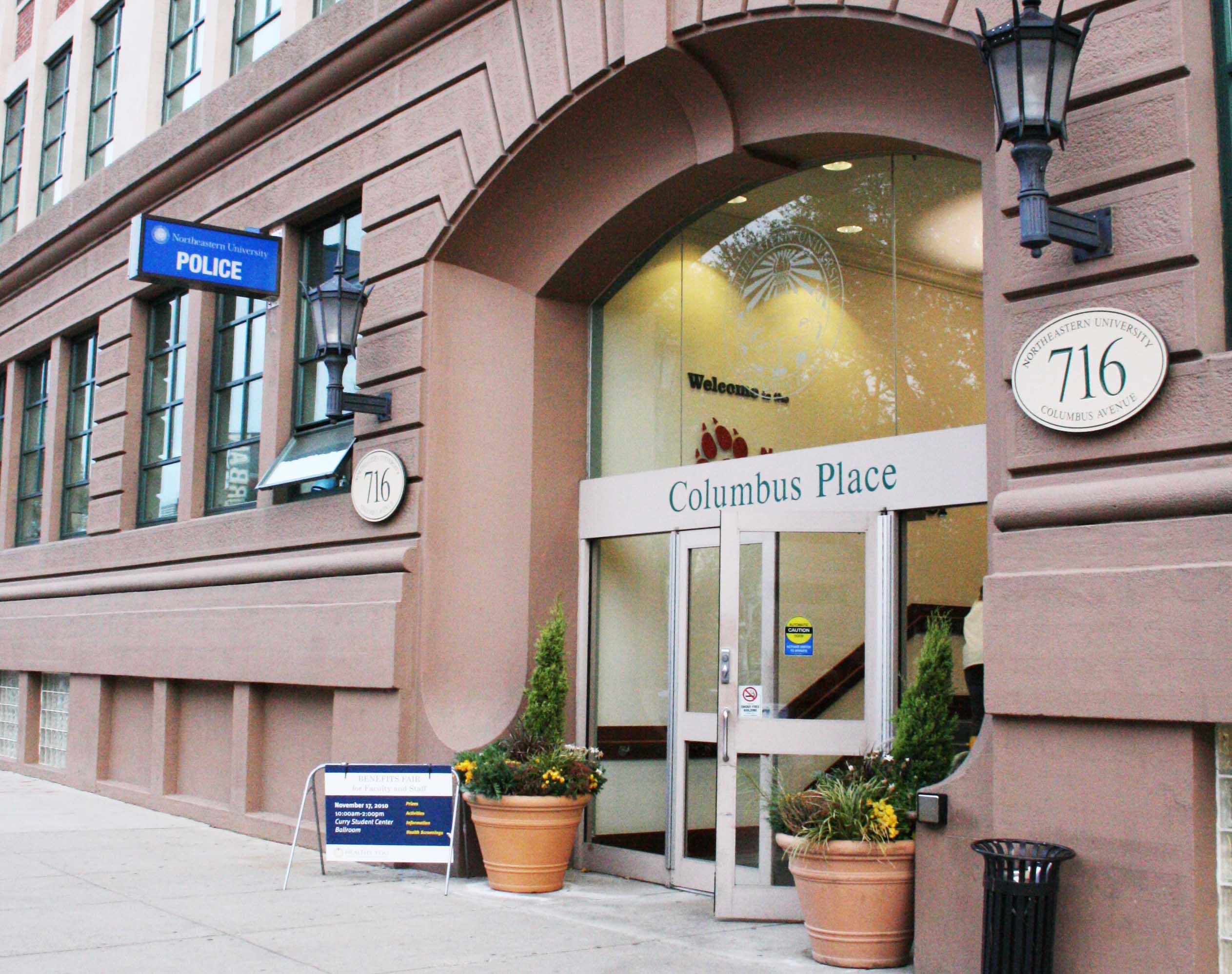Have you ever noticed how many door buttons on campus for students with physical disabilities don’t work? Or perhaps you’ve overheard a Disability Resource Center (DRC) notetaker complain about the minor inconvenience of having to submit class notes within twenty-four hours? I hadn’t paid much attention to such grievances until I became a peer mentor for You’re With Us!.
You’re With Us! is a nonprofit organization that integrates young adults with disabilities into welcoming communities, such as local university campuses that support their social and emotional development. To accomplish this goal, You’re With Us! trains college groups and student mentors to create meaningful friendships with their peers with disabilities.
You’re With Us! established a partnership with Northeastern University in 2015 to jumpstart its program. It encourages community members with disabilities and students seeking relationships beyond campus to learn from one another through shared experiences. While a step in the right direction, this partnership is only one of many initiatives Northeastern should undertake to increase inclusivity.
While the Federal government requires public schools to ensure equal access, private universities like Northeastern do not have the same legal obligations. Public secondary schools abide by the Individuals with Disabilities Education Act (IDEA), Section 504 of the Rehabilitation Act, and Title II of the Americans with Disabilities Act (ADA). These laws mandate free appropriate public education in the least restrictive environment, protect civil rights of those in disabilities programs that receive funding from the federal government, and prohibit discrimination by governments against individuals with disabilities, respectively.
As required by the law, Northeastern upholds these policies by mandating inclusive educational opportunities for all Northeastern students regardless of physical or intellectual disability. Such policies differ from IDEA, which calls for individual education plans and specialized instruction.
As a Northeastern student and former You’re With Us! mentor, I have learned more about the resources, or lack thereof, catering to students with disabilities on campus. In addition to the bare-bone legal requirements of the aforementioned policies, the university should provide extra resources supporting students with disabilities.
The DRC works to ensure students with disabilities, as defined by the Americans with Disabilities Act as Amended (ADAAA) of 2008, can fully engage in university opportunities. The center’s establishment in 1978 made Northeastern stand out for its long-term efforts to create a more inclusive academic experience and rank competitively in accessibility compared to other universities.
Unfortunately, according to conversations I’ve had with administrators, it is not uncommon for departments at Northeastern to be relatively understaffed. Simultaneously, they remain under pressure to perform, as staff transition office functions between online and in-person due to COVID-19. This situation is disorientating and unconducive to aiding students transitioning or looking to maintain a healthy university lifestyle.
Given COVID-19 and the consequential rise in demand for educational support from students, the university should place the DRC as a higher priority to ensure it can adequately aid students with disabilities transition to college. Specifically, this could entail the maintenance of campus facilities, enhancement of the Learning Disabilities Program (LDP), provision of additional resources for students, and the development of educational initiatives to inform students on how they can build a more inclusive campus.
Any Northeastern student, faculty member, or staff can submit facilities work requests via myNortheastern to report malfunctioning door buttons. However, work requests are subject to the bystander effect; students might not feel responsible for completing requests because hundreds of others are also using the door, leaving some broken facilities unnoticed. It would be beneficial to have a staff member at the DRC walk around campus occasionally to ensure that all access points for students with disabilities are functioning properly and pinpoint locations that could be more accessible.
While mentoring for You’re With Us!, I noticed that some mentees utilized wheelchairs and were occasionally unaware of the best traveling routes; an integral part of our trips included locating sometimes obscure elevators, ramps within buildings, and wheelchair-accessible entryways.
To mitigate this dilemma, the DRC could help facilitate the placement of elevator access and directional signs for wheelchair accessible routes. Consequently, new members of the Northeastern community can become better acquainted with building layouts and more easily travel around campus.
Northeastern currently integrates students with disabilities through providing transitional training to acquaint students with university-level curriculum, help them advocate for themselves, and understand what resources are available to them. The DRC presents this information via virtual tutorials covering topics ranging from the difference between accommodations in secondary schools and Northeastern to what technology is available to aid learning.
However, transitioning to college and adjusting to a new lifestyle takes time and should extend beyond a few videos and bits of information from an assigned advisor.
Unfortunately, an understaffed department on campus can only do so much to provide exceptional transition services for students with disabilities. Northeastern ranks thirty-fifth out of fifty schools in Great Value Colleges’s picks for America’s top colleges for students with disabilities. This ranking is comparatively worse than other ranking systems that emphasize other aspects of Northeastern’s experiential learning, overlooking the university’s inadequate support of students with disabilities. This lower rank is significant because it identifies the exclusivity of Northeastern’s Learning Disabilities Program (LDP).
The LDP is a fee-based academic program for undergraduates with primarily a learning disability. Students accepted to the program meet regularly with a specialist to set goals, review effective learning methods, and monitor their progress.
Unfortunately, the LDP only accepts forty-five students annually. Students may submit applications after university admission, meaning students often do not hear back until after they decide to enroll. In worst case scenarios, if the LDP does not accept them, students who anticipated additional academic support struggle for the duration of their undergraduate careers.
Although Northeastern fairly acknowledges the need to include students with disabilities, there remains room for improvement in the LDP. No student should have to barely get by due to the university’s failure to provide adequate assistance. With more resources, the DRC may accept a greater number of students to the LDP and seek to provide more specialized programming than general transition materials.
The DRC can be a vital resource to aid students struggling through online learning and ease the transition back to the classroom by providing advice on managing coursework when one feels easily diverted from their work, overwhelmed, or completely disinterested. These stress-management tips can be helpful for all students whether or not they regularly utilize DRC resources.
Drawing inspiration from University Health and Counseling Services (UHCS), the DRC could provide support groups for students with disabilities transitioning to the college lifestyle, or help connect students with relatable peers living with a physical or intellectual disability.
Currently, UHCS only provides pandemic transition and international student experience support groups for Northeastern students in Massachusetts. A greater array of opportunities for students with disabilities could help bridge the gap between emotional and medical needs while being flexible enough to meet the demands of each support group cohort. An increased sense of community can help to ease feelings of loneliness and judgment from others and provide a sense of empowerment to students with disabilities.
Engagement opportunities for students unfamiliar with the work of the DRC could also be a great asset to building a stronger campus community. Alongside being a notetaker for the DRC and mentor for You’re With Us!, I want to raise awareness for the DRC’s important work. After seeing how helpful these resources have been to those close to me, I have a deep appreciation for how they are seeking to assist students with disabilities.
Part of the DRC’s responsibilities should also include teaching all students how to communicate with their peers with disabilities respectfully. Students may worry about properly referring to people with disabilities or whether it is appropriate to ask questions about their disability.
A Scope study approximated that 67 percent of respondents experienced discomfort while interacting with people with disabilities, often due to “a fear of seeming patronizing or saying the wrong things.” Meanwhile, 20 percent of 18 to 34-year-olds have avoided speaking to people with disabilities because they were not sure how to communicate with them properly. Teaching respectful interactions that normalize communication between students with disabilities and those without is a vital step in creating a welcoming environment in the Northeastern community.
Conversations about effective and respectful student interactions with varying abilities can occur at orientation or 1000 level introductory courses. During orientation, students can hear from different departments and centers on campus and receive messages that the university would like to emphasize from day one, such as its beliefs about inclusivity. Similarly, 1000 level courses permit offices on campus to discuss important topics, creating an opportunity for a DRC presentation that details how to refer to students with disabilities, when it is appropriate to offer help, and how to maintain balanced relationships between students with disabilities and those without.
Creating connections requires branching out from one’s comfort zone and accepting others’ differences and what makes them unique. Small interpersonal connections through hobbies and shared interests go a long way to increase one’s sense of belonging. Consequently, friendships help increase a person’s overall health and allow for exploration of their identity. Friendships help students obtain the confidence to engage with others who are different from themselves.
Opportunities to educate students about the history of disability rights could also provide a greater level of understanding. Currently, Northeastern fails to provide the same level of advocacy for the community of students with disabilities as marginalized student groups on campus.
For instance, leading up to the 2020 presidential election, many centers on campus provided information to students on why it was important to vote and how to go about doing so. At cultural centers, in particular, the emphasis was on the suffrage’s history and how it helped advance the interests of the respective marginalized groups. However, the DRC did not publicly produce materials or host events about policies that may impact individuals with disabilities or how to overcome barriers associated with the voting process.
Members of our community with disabilities provide a unique perspective and innovative ideas for a better society; yet, the US has historically turned a blind eye to this truth and forced people with disabilities to fight for decades to have their voices heard. Today, various organizations work to ensure that voters with disabilities are going to the polls to protect their rights. Why should certain communities on campus have their experiences and concerns elevated in the name of diversity while others are cast away?
Disregarding the history of people with disabilities is part of a larger trend, not a one-time occurrence. I reviewed course offerings within the departments that I study in—Political Science, International Affairs, Law and Public Policy, and Spanish—to find a course that discusses the rights of individuals with disabilities. To my dismay, there were none; it is utterly shocking that an entire marginalized community has been left out of studies concerning politics and law, the very subjects that aim to highlight the way different communities interact with one another.
Thankfully, some courses exist in other departments such as HLTH 5280: The (in)Visibility of (dis)Ability in Society. This is a course offered within Bouvé; yet, I was able to receive permission from the political science program director to have it count as an elective. Northeastern faculty should continue to encourage opportunities to craft one’s educational experience into a more holistic endeavor in this manner.
The students, faculty, and staff members of Northeastern must begin talking about uncomfortable topics. The university claims to value inclusion, but it must actively demonstrate this virtue. We cannot say that we stand for inclusion when we cannot acknowledge the need for greater resource allocation to the DRC, the nervousness associated with interactions between students with disabilities and those without, and the omission of a core part of society in our course offerings.
If the university effectively welcomes all students by nurturing positive relationships among students of all abilities, students would be more confident in themselves, their interactions with others, and their desire to seek out new experiences. We would be able to foster a community that thinks diversely, challenges norms, and cares for one another. This is the inclusion that Northeastern should be pursuing to create a more enriching college experience for all its students.
Hannah Nivar is the former Executive Director of Communications for the Northeastern University Undergraduate Student Government Association



